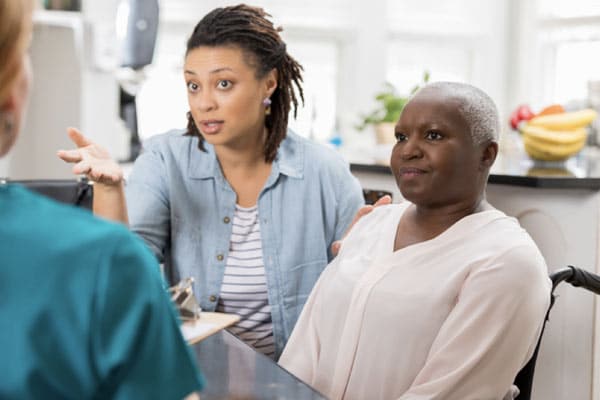Being an advocate for older parents is one of the most important parts of being a family caregiver. Through advocacy, family caregivers ensure their loved ones' wishes are being honored and respected.
But effectively advocating for older parents isn’t one innate skill. In fact, it is multiple skills combined that allow you to observe, communicate, and persevere on behalf of your loved ones. American, Advocate, and Whitsyms In-Home Care shares the information below for tips on how to become an effective advocate for your older parents.
What Skills Can I Develop to Be a Better Advocate for my Older Parents?
- Observation. You’ve worked all day, and now you’re caring for Mom. You’re exhausted. It can be hard to notice the little things when you’re feeling overwhelmed. However, small changes in a loved one’s behavior or health are important and can indicate a looming medical issue that you’ll need to discuss with a loved one’s healthcare team. So how can you improve your skills of observation? Keep a notebook handy so you can jot down your observations about a loved one and track the changes over time. If you live at a distance from a loved one and don’t see them daily, ask neighbors or friends who are interacting with them to share any insight or concerns.
- Communication. In any relationship, good communication is key. Prior to a meeting with a doctor, attorney, or other professionals on behalf of a loved one, have notes ready so that you can communicate clearly and concisely. Because these topics are often stressful, be respectful and set emotions aside when advocating for a loved one. Finally, find out how the office likes to communicate (i.e., via phone, email, text, etc.). Then be sure to contact them that way when you have questions or concerns.
- Questioning. An older loved one’s medical, financial, and legal needs can be complex. It can feel easiest to just go with the flow and take each professional at their word. However, it is vital to raise questions to ensure everyone is on the same page. Learn as much as you can about your loved one’s health conditions and financial and legal affairs. This way, you’ll know what to ask and when. Before meetings or appointments, prepare a list of questions. Overall, it is important to never assume anything and clarify everything.
- Organization. Staying on top of a loved one’s care plan can be challenging. There are often many moving parts, medications, appointments, and more to keep track of, so being organized is vital. If you struggle with organization in general, consider taking an organization course. There are also plenty of apps that are designed to help organize appointments, medication reminders, important documents, etc.
- Tenacity. As an advocate for an aging loved one, tenacity is by far one of the biggest skills you can develop. To ensure that your loved one gets the care and services they need, be clear about your goals and surround yourself with professionals who are dedicated to helping you achieve them. Lean on close friends for support when needed, and consider joining a caregiver support group to learn from others who have been where you are.
Enlisting the help of a professional care provider can be a great help as well. A referred care provider from American, Advocate, or Whitsyms In-Home Care can help family caregivers better advocate for older loved ones, particularly when distance is an issue. Here are just a few of the ways we can help:
- Skilled observation and assessment to monitor condition changes
- Medication reminders or administration as needed
- Recording health data to track any progression or regression of condition
- A wide range of personal in-home care services
- And much more
Reach out to us to find out more about how a skilled and experienced referred care provider can assist your loved one and aid in advocacy by clicking the link to the location nearest you below:
- American In-Home Care – Serving North, Central, and West Coast of Florida
- Advocate In-Home Care – Serving Southeast and Southwest Florida
- Whitsyms In-Home Care – Serving Southeast and Southwest Florida
State of Florida License and Registration Numbers: 30211518, 30211651, 30211295, 30211390, 30210978, 30211293, 30211382, 30211504, 30211733, 30211535, 30211531, 30211710, 30211709, 30211045, 5661


